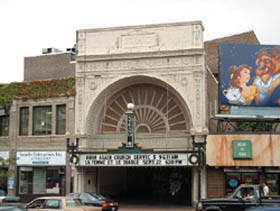Have you ever wondered about the history of the Strand, the venerable looking theater on the corner of Columbia Road and Hancock Street in Dorchester?
The Strand has a long and illustrious history. Uphams Corner is home to many schools, churches, stores, salons, community organizations, a post office, and library. The neighborhood was named after Amsop Uphams, who owned a general store on Columbia Road, back when Dorchester had only a few residences. The Strand Theatre was once a federal house owned by Isaac Clapp. Clapp’s daughter ended up selling the house to Micah Dyer, Jr, who later remodeled it
Many who know the Strand pass by it everyday and don’t take notice that its one of Dorchester’s greatest landmarks. Citizens of the community are familiar with the Freedom Trail, Faneuil Hall and other historic landmarks. But The Strand Theatre is local history.
The Strand was first opened by a fellow name Nathan Gorder. The Boston architectural firm Frank and Wilcox designed the Strand. When the theatre was finished, it was quite the spectacle. “It seemed as if all the world was at Upham’s Corner when the Strand Theatre opened the night of November 11, 1918 as a movie and vaudeville palace,” according to a local paper.
People would come from a far and enjoy the silent movies starring W.C Fields, Valentino and the Gish sisters. The Boston Herald once mentioned that “the Strand is New England’s most beautiful theatre”. This statement was found in the Herald the day after a performance of “Queen of the Sea” produced by Hope Jones, a renowned organist at the Strand. At that time the Strand was the hot spot in Dorchester. Back then famous people like Milton Berle and Fred Allen graced the stage. The Strand was the only premiering movie house for two decades in the city.
However, the Strand Theater did close their doors for a period of time due to bad conditions. The City claimed the property in the early 70’s and years later The M. Harriet McCormack Center for the Arts was chosen to become the operator of the Strand Theater . IN 1979, the Strand reopened it doors after immense renovations.
The Strand Theaternow serves Dorchester as an Art Space and Community Place. In the past, the Black Student Center of UMass Boston has used the facility to do a fashion show. This beautiful, well-equipped theatre has 1,400 seats and is wheelchair accessible. About 125,000 people go to the events held at the MCA/Strand yearly.
MCA/Strand’s mission is to serve their community as a resource of culture and education, disregarding from what background people come. Some communities in Boston get special attention from the Strand. Residents in Dorchester, Roxbury and Mattapan get to experience the varied opportunities and witness the diverse performances that the Strand Theater provides. Affordable dances, music, and theatre performances by local, national and internationally known artists are among the many activities that take place. Training programs at the Strand are the reason of their fast-growing audience and success.
Since the 90’s the theatre has been receiving a great amount of youths in their programs. Different tactics have brought and continue to bring awareness to the community of their programs. Youths that are involved in the programs range from ages six to twenty-two years old. The programs are free and there are no auditions. The recruiting process is not as intense as other programs, so it can be a place where a youth can explore their interests further and not be intimidated. Other benefits are that members can attend performances, participate in other programs or volunteer. There are some who work as paid interns and contracted employees. Activities for youths at the Strand teach teamwork, encourage self-expression and confidence.
Overall the Strand is proof that there are great things happening in Dorchester. The resources that the Strand provides are stepping-stone for tomorrow’s artists. The Strand is truly a colorful place where one can express oneself freely. Ray Bolger himself made his first appearance at the Strand “during the heyday of vaudeville.” For more information about the Strand you can go to their website at www.strandtheatre.org.





















































